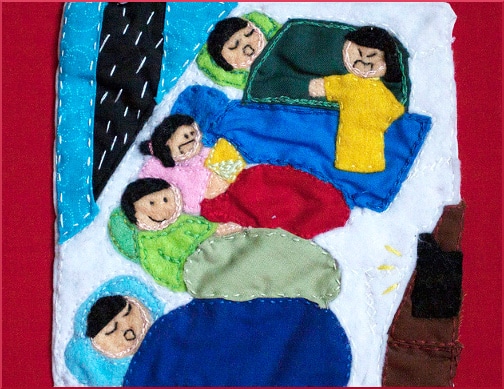
In the United Kingdom, a small study recently showed that seven hours is really the minimum amount of sleep that a child can get by on, without incurring some health deficits. Insufficient sleep appears to create risk for not only obesity but cardio-metabolic instability, which could lead to diabetes, stroke, and heart disease.
A recent seven-day study of sleep and dietary patterns from King’s College, London (with senior author Wendy Hall), used individual tracking devices:
During this time, the participants also wore motion sensors on their wrists that measured the exact amount of sleep they got each night, as well as the amount of time they spent in bed before they actually fell asleep.
The big headline from this research concerned reduced sugar cravings:
The results showed that the participants who increased the amount of sleep they got each night reduced their added sugar intake by as much as 10 grams the next day compared with the amount of sugar they consumed at the beginning of the study. These participants also had a lower daily carbohydrate intake than the group that did not extend their sleep patterns…
To prevent disturbed sleep, many experts suggest avoiding caffeine in the evening. In the old days, only adults, the drinkers of coffee and tea, needed to worry about that. But now that caffeine in is so many consumables — like energy drinks and even beef jerky — a child’s system could be awash in the stuff.
It’s always about screens
In America, we are warned against letting their children watch too much TV, play too many video games, and so forth. There are relatively few mentions of the other causes of poor-quality sleep for kids. But children are also afflicted by grownups who party like it’s 1999; parents who fight until dawn; crowded conditions with several kids to a room, or even sharing a bed.
When struck by crisis or tragedy, children react in four major ways, and one of those is sleep disturbance, often replete with nightmares and night terrors. (The other three reactions are fear of failure, academic regression, and behavioral regression.)
Those obstacles can ruin sleep quality for securely housed children. What is life for kids who live in vehicles, chaotic homeless shelters, and motels where a whole family is crammed into a single room? There are kids in America whose sleep is interrupted by gunshots.
All that being said, it is probably not a good idea to enforce strict silence, either. When a wakeful child is expected to lie down with closed eyes, a certain amount of resistance is understandable. The entire visual world is gone, and all is blackness. If strict silence is also enforced, it’s the emptiness of the Void. For a hearing child, the traditional ritual of being read to sleep can be incredibly grounding and reassuring.
To a deaf child, lying down for sleep is, at the very least, unbearably boring. At worst, it can feel like falling off the edge of the world. With nothing to see or hear, some deaf children also suffer from vertigo.
Falling asleep spontaneously is a great talent that a lot of kids possess. They have been known to sleep through rock concerts. That is extreme, but a baby does need to get used to the real world. At home, an atmosphere of ongoing, familiar, mundane ambient sound, without sudden loud noises, is a good recipe.
Your responses and feedback are welcome!
Source: “Sleeping More May Curb Sugar Cravings, Really,” LiveScience.com, 01/09/18
Source: “Development of the Posttraumatic Stress Symptoms — Childhood Obesity Model,” WKU.edu, 2012
Source: “Helping your deaf child get a good night’s sleep,” NDCS.org.uk, undated
Photo credit: Victoria Harjadi on Visualhunt/CC BY

 FAQs and Media Requests:
FAQs and Media Requests: 











